Job hunting activities in Japan are totally unique and different from those of other countries in terms of their schedule and characteristics. The keys to making your job hunting activities in Japan a success are to learn the schedule of these job-seeking processes, get a head start, obtain sufficient information, and work efficiently.
Characteristics of job hunting activities in Japan
Japanese companies hire new university graduates once a year, as regular recruitment and employment.
Japanese companies tend to evaluate a person’s potential in terms of how much he or she can contribute to the company in the future. Therefore, they recruit a large number of people on graduation from college. This is a characteristic unique to Japan.
Undergraduates begin making preparations in the fall of their junior year, and graduate students, in the fall of their first year (one and a half year before graduation).
What do preparations consist of?
Self-analysis, corporate research, job research, participation in employment fairs and other events, visiting former university graduates at their offices, etc.
Corporations begin conducting recruitment activities in the winter of a student’s junior year (one year before joining the company).
What do employment activities consist of?
Company information sessions, document screening, written tests, interviews
How long do employment tests last?
1 to 3 months
University seniors receive unofficial offers from corporations in spring (one year before joining the company).
General employment schedule in Japan
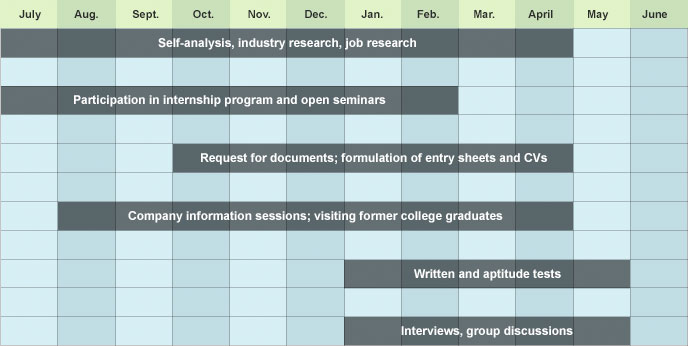
Overseas students’ employment status
Recently, a growing number of overseas students opt to remain in Japan even after graduation and work at a Japanese corporation by making use of the knowledge and skills they have acquired in college. Of the 155 overseas students who graduated from Meiji University in March 2011 (excluding those in the latter half of the doctorate course and in professional graduate schools), 31, or 20%, found employment in Japan. The number of such students continues to increase each year.
Things that Japanese companies expect of overseas students
Now that business is becoming increasingly global, an increasing number of corporations are considering actively hiring overseas students to expand their operations overseas.
It is said that the qualities that a company looks for in a student, regardless of nationality, are communication skills and vitality. After studying and living in a different country, most overseas students are fully equipped with these qualities. Moreover, the fact that these students have a global sensibility that is necessary for conducting business activities in other countries makes them attractive human resources for Japanese corporations.
Regarding Japanese language skills that Japanese corporations seek in overseas students, 68.8% want the students to be able to create documents such as reports and business letters in Japanese, and 26.2% want them to be able to carry out business interactions in Japanese. In other words, most companies demand that students have Japanese language proficiency that is higher than the everyday conversational level.
* Source:"Survey on the Employment of Overseas Students in Japanese Corporations," June 2009, by the Japan Institute for Labour Policy and Training.
Meiji University’s job hunting assistance to overseas students
Meiji University carries out numerous job hunting assistance programs specifically for overseas students. Below are some of the examples.
Guidance on job hunting and career paths
Advice is given on how to carry out self-analysis and industry research, write CVs, and view the wanted ads, while providing explanations on how job hunting activities are basically carried out in Japan.
A course on how to take written tests successfully
Tips on how to do well in written tests which all job seekers are required to take.
A course in business Japanese
This is a course to learn and acquire Japanese language skills needed for hunting activities and as a full-fledged member of society. Emphasis is placed especially on acquiring writing and speaking skills.
A course on business manners
Students learn, through group work, differences in business etiquette between Japan and other countries, and what sort of impact personal etiquette and first impressions make.
A course on how to take interview tests successfully
Students practice getting interviews in a role-playing format while keeping business etiquette in mind.
Having entry sheets and CVs corrected
Entry sheets and CVs are proofread and corrected by career counselors.
Reports on older overseas students' job hunting activities
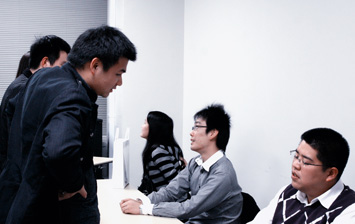
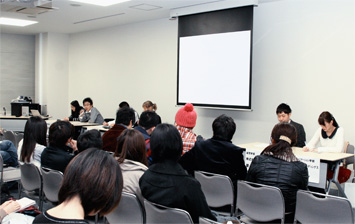
University seniors who have been unofficially accepted by Japanese corporations, talk about their experiences in seeking employment in Japan. This will be an opportunity for prospective job seekers to ask directly about their concerns and doubts regarding job hunting activities.
Comments by overseas students who successfully landed a job with a Japanese corporation: "The secret to getting employed in Japan"

| Ms. Zhou Weinan |
| China |
| A second-year student at the Graduate School of Commerce; received an unofficial job offer from a Japanese precision equipment manufacturer |
When I failed to pass an interview test, I lost confidence that I might not be competent enough. Now that I’ve ended my long job hunting activities, I feel that luck and personal connections got me this job. There are many preparations you can do yourself such as self-analysis and industry/corporate research, but I also feel that analysis by others, which is an objective evaluation by a third person, is also important.
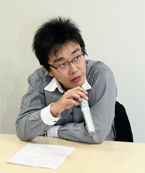
| Mr. Yu Kinyu |
| China |
| A second-year student at the Graduate School of Commerce; received an unofficial job offer from a Japanese securities firm |
Unless you can express your strengths and selling points in your own words, you will never be selected by a corporation. This is the same as a product having no special sales points not performing well. If you engage in self-analysis, you naturally discover things you want to do, and things you think you can do by making use of your capabilities. At the interview, I think it’s important for you to honestly express these things to the company.
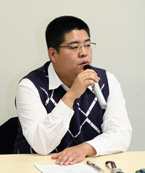
| Mr. Jin Zhe |
| China |
| A second-year student at the Graduate School of Commerce; received an unofficial job offer from a Japanese road project company |
Many overseas students must feel nervous at a group interview, where they are the only foreigner and all the rest are Japanese. They must worry if they could sell themselves well, and if their Japanese is good enough to get their message across. I, too, was nervous. But after a while, you get used to interviews. Besides, Japanese corporations have become increasingly globalized, so there are no differences between Japanese and overseas students. Compared to Japanese students, overseas students may be at a disadvantage in terms of language; on the other hand, however, I feel that Japanese corporations evaluated our diverse backgrounds and global mindsets that Japanese students do not have.
It is essential for overseas students to understand Japanese culture; I also feel it important not to get too used to it. I feel that the key was for us was to gain a deep understanding of the Japanese culture, then make use of our backgrounds and demonstrate our unique characteristics.

| Ms. Dina Grib |
| Russia |
| A second-year student at the Graduate School of Arts and Letters; received an unofficial job offer from a Japanese travel company |
I had no knowledge whatsoever about how job hunting activities were carried out in Japan, so employment assistance events that the university carried out were extremely helpful. One thing I strongly felt through my hunting activities was this: Although it is important to emphasize that, since I’m a foreigner, I can do “X,” Japanese corporations checked to see if we overseas students were balanced enough to get along nicely with the Japanese people and function in a Japanese cultural environment.
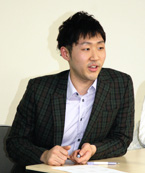
| Mr. Che Yofang |
| South Korea |
| A fourth-year undergraduate student at the School of Business Administration; received an unofficial job offer from a Japanese electronics device manufacturer |
Corporations select the students. However, I feel that it was also important for the students to closely examine, during company information sessions, interviews and other forums, if a company fits them in terms of corporate climate. Job-seeking activities can be long and tough. When I was feeling down, I was helped by older students, co-workers from my part-time job, and friends. Without their cooperation and support, I don’t think I would have succeeded in finding a job in Japan.
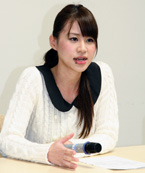
| Ms. Chin Liei |
| Taiwan |
| A fourth-year undergraduate student at the School of Information and Communication; received an unofficial job offer from a Japanese precision equipment manufacturer |
Overseas students have a second option of returning to their native country. This may sometimes make them less serious than they should be. In fact, of my overseas student friends who were carrying out hunting activities, hoping to work in Japan if given the opportunity but not ruling out the possibility of returning to their native country, very few successfully landed a job in Japan. Amid the weak Japanese economy, finding a job is extremely difficult even for Japanese students. Overseas students should remember that the situation is even more difficult for them.
Exchange Meeting with Former Overseas Students Working in Japan
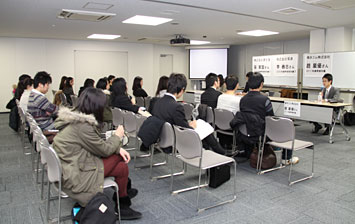
Former overseas students working in Japan talk about their experiences in seeking employment in Japan and their current job.
Comments by former overseas students working in Japan: "The secret to getting employed in Japan" and "Merits and demerits of working in Japan as a foreigner"
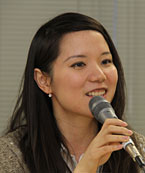
| Ms. Jieyun Zhang |
| China |
| Degree from the Graduate School of Commerce in 2011 Working at the Marketing Development Department, China Business Division of Shiseido Company, Ltd. |
While I am sometimes confused by differences with the business practices I am accustomed to in Japan, I do have more knowledge of Chinese business customs and Chinese tastes than my Japanese coworkers. There is thus work that only I can do, and this is a great advantage for me. I would like to continue working in the future in jobs where I can be a bridge between Japan and China.
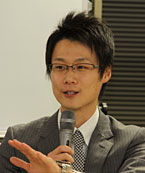
| Mr. Cho Sungwoo |
| South Korea |
| Graduated from the School of Commerce in 2011 Working at Yokohama Tire Corp. |
Japanese companies will not be able to make it in the future by focusing solely on the domestic market. There are many companies in Japan where overseas students with a global outlook and possessing different backgrounds and ways of thinking from Japanese people can exhibit their abilities. Let’s do our best together on the world stage as fellow overseas students!
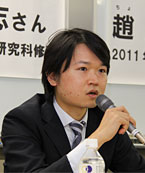
| Mr. Li Chunzhi |
| China |
| Degree from the Graduate School of Commerce in 2009 Working at Dentsu Inc. |
If you want to work in Japan, I think it is important to sharpen your skills for working in Japanese society while still a student. Those include Japanese style communication including Japanese language. It is also important to research companies and industries to find out what corporate cultures fit you and in what industries you can exhibit your strengths. That will help prevent discovering a mismatch between you and the company you have chosen after you are hired.
Japanese companies seem to be increasingly active in hiring overseas students as they expand globally. Due to that, it seems that the job-hunting situation is not as tough for foreigners when compared to the “ice age in recruitment” that Japanese students are facing.
Links
-
The Employment Service Center for Foreigners
http://tokyo-foreigner.jsite.mhlw.go.jp/english
http://osaka-foreigner.jsite.mhlw.go.jp/e-toppage
The Center is located in Tokyo and Osaka. It is a public employment service center for foreign nationals who have studied in Japan and wish to work in specialized and technical fields.
-
Center for Student Employment (Japanese)
http://job.gakusei.go.jp/
This is a government institution and an outpost of the "Hello Work" job placement office established by the Ministry of Health, Labour and Welfare. One such center is set up in each prefecture.
- Employment Information Center, International Foreign Student Association
(Japanese)
http://www.ifsa.jp/
This is an employment information center for overseas students living in Japan, run by the International Foreign Student Association, or IFSA. If you register as a member, you will receive corporate and other information.











